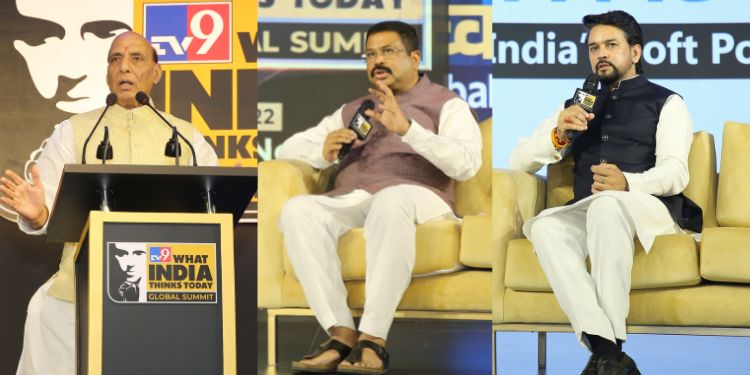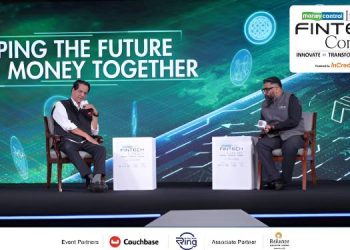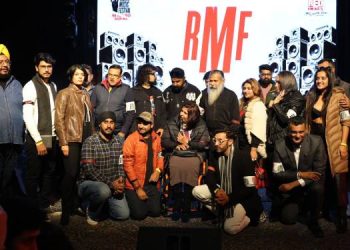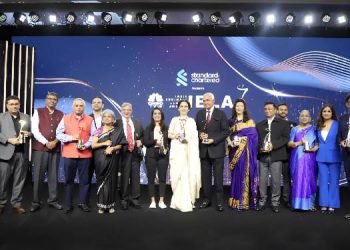After the success of day one of TV9 What India Thinks Today Global Summit, the discussions of the theme ‘Vishwa Guru: How Near, How Far?’ intensified on the second day with Defence Minister Rajnath Singh setting the tone stating the country would achieve export of defence items of about Rs 40,000 crore by 2024-45.
“The current figure is about Rs 13,000 crore which is about 670 per cent more than the Rs 1,940 crore figure in 2014,” said Singh.
Narrating how his ministry has become the flag bearer of Atmanirbhar Bharat, Rajnath Singh said 41 ordnance units, some of which are about 200 years old, have been restructured and corporatized into seven companies and six of them are already making profits.
“These factories have been modernised and made more efficient. Six of these seven are already making profits,” said the minister, describing the step as a “very big reform.”
He also said of the total capital outlay of Rs 85,000 crore, 68% has been kept aside for domestic players both in the public and in the private sector. Moreover, 25% of this 68% has been kept for the private sector alone. The ministry has also identified 310 defence items entirely for domestic production, which will be manufactured in the next two to three years and will not be a part of the imported items.
While Rajnath Singh began the proceedings on Saturday, speaking next Ashwini Vaishnaw, Minister for Communications, Railways, Electronics & Information Technology said that by the end of this year, 5G services would be rolled out in about 25 cities and towns. The deployment of the technology would begin from August-September said the minister.
Vaishnaw said, “We have to lead the world in the 6G services.” He also stated that the first bullet train would run in India in 2026. Vaishnaw also said that the railways will make about 1.5 lakh appointment by mid-2023.
Union minister of Sports, Youth Affairs and Information and Broadcasting Anurag Singh Thakur spoke on how both Indian films and India as a location for shooting and processing films can help increase the country’s soft power.
“Content is king and India should become the content hub of the world. India should attract foreign filmmakers, documentary makers, short film makers to come here and utilise our resources. We have a lot of scenic places perhaps unmatched anywhere else in the world. India can become a big centre for post-production work,” said the minister.
“Cinema packs a soft power potential that is perhaps unrivalled by any other medium,”remarked Thakur.
He also pointed out that the media and entertainment industry will rise from $24 billion industry now to about $100 bn in 2030. Thakur also mentioned how cultural tourism has gone up in the country. About a lakh of tourists converge on Benaras a day which is easily an increase by 10 times compared to earlier days, stated the minister.
Both Rajnath Singh and Anurag Singh Thakur tried to assuage apprehensions about the Agnipath scheme unfolded earlier this week by the government and said that the agitators should refrain from violence. The plan will not only make the country strong but will also help a number of youths to plan their careers in different sectors with four years of military training, said both the ministers, adding that the government is always ready for discussion and sharing information.
Hardeep Singh Puri, Union Minister for Housing & Urban Affairs, said that in the Agnipath Scheme Government has increased the age limit, fixed reservation for Agniveers. The minister added that many PSUs under his ministries are looking to hire these people because they can use these skills for nation-building.
Union Minister of Women and Child Development Smriti Irani pointed out how building toilets in the schools has substantially reduced dropout rates in the country. Incidentally, Prime Minister Narendra Modi was the first prime minister to talk about the importance of toilets for women from the ramparts of the Red Fort, she said. The government has set up more than 11 crore toilets in the country.
Minister of Education and Minister of Skill Development and Entrepreneurship, Dharmendra Pradhan said the process of compilation of National Education Policy is almost like drawing up the Indian Constitution. “NEP is a vision document for the 21st century,” he said. Indian education needs to be job-oriented and skill-based, which is guided by NEP, the minister added.
The Global Summit played out a message from Malaysian Foreign Minister Abdulla Shahid, who is the President of the 76th session of the UN General Assembly. ‘’The current multilateral world order remains the biggest equalizer. Multilateralism is where every country has a voice, a vote, and a seat, regardless of its size and might,”he said.
What India Thinks Today brought on stage not just policymakers but also influencers from the world of sports. Anju Bobby George, Pulella Gopichand and Bhaichung Bhutia spoke on India’s quest to win 50 gold medals in the next Olympics.

















